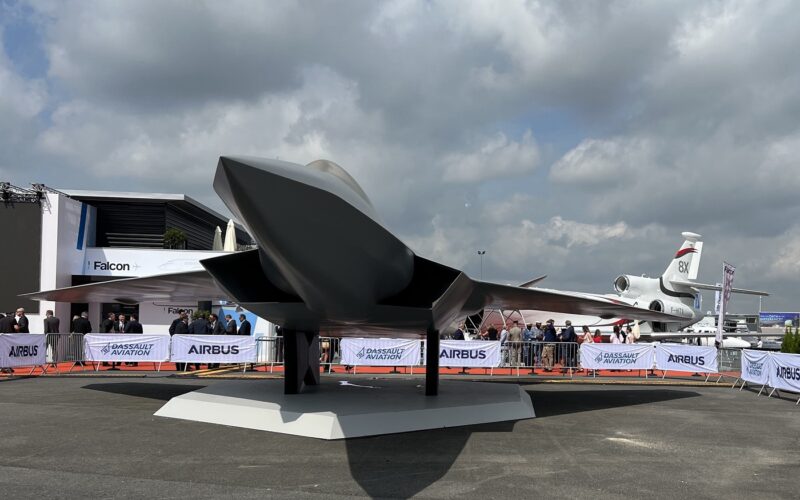In a surprising development, Germany is contemplating leaving the Future Combat Air System or FCAS project with France and Spain and instead joining the British-led Tempest program, recently renamed Global Combat Air Programme (GCAP).
The information was first reported by the British newspaper The Times, citing sources close to Germany’s Federal Chancellor, Olaf Scholz.
As per these sources, there is growing apprehension in the German leadership that the FCAS project could become a “white elephant” and fall behind competing sixth-generation fighter programs, such as the US Next-Generation Air Dominance (NGAD).
Additionally, Scholz is concerned about the alleged preferential treatment given to French aerospace companies during the early stages of the FCAS project.
To negotiate Germany’s entry into the GCAP program and join the United Kingdom, Italy, and Japan, Scholz has a powerful card up his sleeve: the pending export of 48 Eurofighter Typhoon jets to Saudi Arabia.
In July 2023, the order negotiated by the UK was blocked by Germany, due to concerns about the Saudi-led coalition’s actions in the Yemeni civil war and the 2018 assassination of Saudi journalist Jamal Khashoggi in the Saudi consulate in Istanbul, Turkey.
In response, Saudi Arabia sought alternative offers from France, with the potential acquisition of 54 Rafale fighters from Dassault Aviation.
A doomed marriage?
The FCAS project is described as a “system of systems,” composed of seven subprograms or “pillars” distributed among various manufacturers.
One point of contention, however, has been the leadership of the Next Generation Fighter (NGF) subprogram, which forms the core of FCAS. While Dassault was initially supposed to lead this subprogram, disagreements emerged with Germany and Airbus regarding control over various aspects of the project, including flight controls, cockpit design, and stealth capabilities.
Dassault’s CEO, Eric Trappier, voiced concerns regarding the protection of the company’s intellectual property pointing out that Dassault had over 70 years of experience in supplying fighter jets to the French Air Force and other nations, compared to Airbus, which has a relatively recent history in defense-related activities.
In December 2022, while the governments of France and Germany were seeking an agreement among industrial stakeholders, Trappier emphasized the need for safeguards, stating, “If I share my knowledge today, and the program is canceled within two years, how can I ensure protection from potential competitors?”
Trappier also regretted the inclusion of the Spanish branch of Airbus in the program, which created an imbalance in the negotiations.
France ready for plan B
On multiple occasions, Trappier has discussed the possibility of a contingency plan should the FCAS not succeed. Dassault’s CEO has proposed an alternative “method of governance” where the prime contractor would have the authority to select the participants in the program’s industrial base, rather than relying on the involvement of governments.
A similar approach was employed in the development of the nEUROn stealth combat drone demonstrator, which engaged six European countries in the process.
The nEUROn, which took off for its maiden flight in 2012, could play a major role for France if the FCAS were to fail. In the framework of the next French military programming law for the 2024-2030 period, an amendment hinted at an FCAS alternative.
“The Rafale F5 standard will be developed during this military programming law,” the amendment drafted in May 2023 stated. “It includes in particular the development of a drone accompanying the Rafale, resulting from the work of the Neuron demonstrator.”
A house of cards: Franco-German defense programs
The potential decision to cancel the FCAS has raised questions about the consequences it might have for Franco-German relations, which are already strained on various fronts, particularly defense.
In December 2021, the Franco-German MAWS project, initiated in 2018 to modernize the maritime patrol aircraft fleet of both countries, was canceled after the German decision to acquire five US-made Boeing P8 Poseidon maritime patrol aircraft.
In October 2022, Germany launched an initiative called European Sky Shield, which aimed to mutualize air defense capabilities over Europe through joint acquisitions. The systems being considered were the German IRIS-T SLM, the Israeli Arrow-3, and the US-made Patriot systems, shunning the Franco-Italian ASTER 30-SAMP/T system.
More recently, sources reported that Germany could pull out from the MGCS project, which was to see Paris and Berlin join forces to develop the replacement for the Leopard II and the Leclerc main battle tanks.

